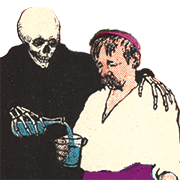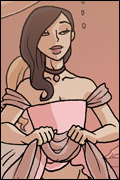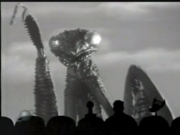|
Rappaport posted:Maybe this is reductionist, but don't basically all 4X games feature an "are we the baddies" moment, because the inherent game mechanics force you into war crimes? Even with "diplomacy" solutions the player usually has to commit genocide. I have the Civ 5 cheevo of playing as Gandhi with minimal cities, but still.
|
|
|
|

|
| # ? Apr 28, 2024 03:32 |
|
Halloween Jack posted:I find that they have an inherently pessimistic view of civilization, yes. Generally games with one winner will have that. That's inherent to games.
|
|
|
girl dick energy posted:I'm not sure how many games have managed to both be the third category and fun. I'm sure it's possible, but unless your politics are as soft-edged and nonconfrontational as possible, as a game designer you have to balance what delivers your message best and what makes for the best game. skeleton warrior posted:I would throw in a fourth, which is "inherent politics". Consider it "unintentionally politically minded games". Opinions of it may vary, but I’ve had great fun with John Company in both editions. It very much wears its politics on its sleeve, using contemporary 1700s political cartoons to portray the British we play as ruddy bulbous gluttons while using either truer to life art or pictures in a local style to portray the people of India. Meanwhile mechanically it portrays colonialism as a purely profit-generating venture: if you’re no longer making money, the company folds and the game ends. Though maybe how every war movie romanticizes war in some way, maybe there can’t be a game where you play colonizers that doesn’t romanticize colonialism in some way. Triskelli fucked around with this message at 17:30 on Oct 7, 2023 |
|
|
|
|
Doctor Spaceman posted:Yeah the designer's notes in the rulebook make it clear that it's a depiction of a worldview and not an endorsement
|
|
|
|
When Hegemony was first announced, it piqued my interest. But the first thing I saw when looking into its approach to the subject matter was someone essentially asking on BGG "Where's communism?" and one of the designers answered with basically, "It's too effective so we left it out to be fair to the capitalists and bourgeoisie players. Reform is revolution." So I kind of wrote off its politics.Varnavas Timotheou posted:Indeed, it was a bit tricky to implement pure Marxism as its goal, the establishment of a socialist society and the transition towards communism would render the game unplayable for at least one of the players. Meaning that if, for example, the state would adapt this framework, private businesses would not exist anymore as the means of production would be state-owned. Hence, the capitalist class would not be able to participate in the game and the middle class would lose its small-businesses and it essentially would become a cooperative game between the state and the working class (which sounds fun, but would simply not make sense in our game). As our goal was to let all players stay in the game until the end, we decided not to implement this option and, alas, had to keep the capitalist framework as the underlying socio-economic system. However, we implemented a lot of de-facto socialist policies (e.g., an expanded welfare state, free health and education, the option to nationalize private businesses, extensive labor regulation and so on) and gave the working class a lot of actions such as strikes, labor movements, student protests which can be regarded as “direct action” by the left. If played right by certain players and played wrong by others, the nation could actually become borderline socialist with only little missing for its final form. Therefore, we adapted Gramsci´s “war of position” approach which would entail the creation of a counter-hegemony not through dramatic coup d’états (which in our western societies would be almost impossible given the fact that the cultural hegemony of capitalism is deeply engrained in civil society), but instead, through gradual changes which are a form of revolution in itself. Full disclosure: I edited the expansions and solo version of the game. The designers seem like nice, well-educated guys, but personally, a politically minded, asymmetrical boardgame explicitly all about class struggle that just doesn't even account for worker revolution or communism is just a nonstarter for my tastes. Cole's/Wehrlegig Games's approach to political and historical games is increasingly becoming my standard for assessing tabletop games on this axis.
|
|
|
|
FMguru posted:They tried the same trick with the follow-up game (Labyrinth) about the GW Bush-era War On Terror, with much less success. Turns out that Kissinger/Kennan/RAND/NSC-68 was a much stronger base to build a game on than the op-ed columns of Thomas Friedman. Yeah the asymmetry in Labyrinth really does it no favors as a game- the approaches are very hemmed in and a lot of the basic mechanisms of what the jihadist and US players are trying to do come down to die rolling in a way Twilight Struggle handles better. Even Imperial Struggle is better than Labyrinth, though it is also much more abstract. IS is a more interesting game than Labyrinth, though, as a game itself, though I don't think it quite has the juice Twilight Struggle does. Mr. President's take on politics is i think more a function of the domestic politics being a somewhat half-baked addendum to the foreign policy board. Actually capturing US domestic politics in a detailed way would involve an entire game of its own I think, and the design there has a lot more going on in the world side, though as the game says, if you want to do what it calls winning, you need to win on the domestic side and not lose on the foreign policy side. I did a playthrough of it, and I think it suffers from the same thing most solo games have in that they're more experience generators than interesting decision generators, though it does try to have more decisions than most other solo games.
|
|
|
|
JMBosch posted:When Hegemony was first announced, it piqued my interest. But the first thing I saw when looking into its approach to the subject matter was someone essentially asking on BGG "Where's communism?" and one of the designers answered with basically, "It's too effective so we left it out to be fair to the capitalists and bourgeoisie players. Reform is revolution." So I kind of wrote off its politics. This comment makes me think it might be cool to have a game where the modules controlled by the classes can change between players. So, the ownership class starts with the Factories board among other things, but the state could nationalize them and take control of them, or the working class could seize them, etc. Moving around like a company charter in an 18XX game.
|
|
|
|
I think it'd be really hard to make something like hegemony able to just, have radically different structures of how money goes around the board and still be much of a game. I kinda feel like the nod to communism is basically the Working Class having an advantage in a 'multiplayer solitaire' style of play. Your mileage may vary.
|
|
|
|
I actually disagree a lot with the idea a Socialist version of the game is basically just a cooperative game, because honestly my first thought once I got used to playing the game is you could easily make a Soviet version of the game; the 1:1 substitution with minor differences in gameplay is to make the Capitalists into the abstract representation of major state-owned firms or perhaps the Army, the middle class can be a hodge podge of either the "Outer Party"/Komosols/Military Officers and lower level bureaucrats trying to meet ends meet (aka like the player character in Papers Please with the Working class largely unchanged and the State being well, the State. This thought comes from that my interpretation of what the "State" is in the game is less El Presidente but more like a combination of what people think of as the Deep State, i.e career bureaucrats and also higher level policy makers, like the Cabinet/Department heads who are trying to fiddle with levers to keep things going. This can be pretty easily without much fiddling also represent historical Soviet states i.e USSR/China/Vietnam, where you always have this sort of core of Technocrats, Dengists etc who are trying to "make things work" and then you have other interest groups factions; i.e I can easily see the Working class easily "working" (heh) in this variation of the game; they could be Maoists for instance fighting Dengist technocrats; and then looking at real world examples like North Korea or the USSR in the 30's with the Five Year Plans, the way they just exploit the working class and peasantry to extract their surplus labour to industrialize can easily be represented in the sort of abstract ways Hegemony seeks to model the conflicts and incentives to cooperate between interest groups. Looking at the game less from the lens of "These are different socio-economic classes" and more like Victoria 3-esque "Interest Groups" and my thinking makes a lot of sense to me; and I think you can easily adapt the game to support different socio-economic contexts, whether its a Soviet style Socialist State or something else. You could make a cooperative version of the game where you're trying to all work together to cooperate against external crisises but there still needs I think to be internal contradictions to keep it interesting. Like an event like "INVASION!" where unless its responded to results in losing half of your Dwarves (what I like to call the Short Guy with Hard Hats pieces) but only like 1/4 of your "Middle Class" population and only like 2 Industries for the "Capitalists" and you still create a game of internal policy disagreements and conflict. You don't necessasarily need to eliminate the capitalist player, just kinda shift around their role and abilities. Like historically in Mao's China until most got purged there was a time in which private enterprise was encouraged under Communist rule because it was thought (Mao had argued this as far back as 1934) that they would be indispensable to develop the economy. So in terms of abstractly modeling Socialist governments as they existed I think there's multiple paths you could do to represent it.
|
|
|
|
Triskelli posted:Though maybe how every war movie romanticizes war in some way, maybe there can’t be a game where you play colonizers that doesn’t romanticize colonialism in some way. 1) The way the storyteller actually tells the story makes the fantasy too exciting or enticing (in film, it's often about cool characters, slick and stylistic direction/editing, exciting and/or triumphant action scenes, etc.). Sometimes it's completely unintentional, but sometimes the inclusion of these things is what gets a project funded because producers think the target audience needs them to enjoy the story (a sort of lowered expectations that forces most stories to be less and less subtle, nuanced, or complex). 2) Most audiences have poor media studies education and low media literacy and will simply not see or actively ignore subtext or even text that detracts from whatever they find exciting or engaging about the story. Most people seem to think the problem is almost entirely #1, and it is a big issue. But as time goes on, I think #2 is actually having a much bigger impact overall. Personal ideology and bias; the inability to grasp how storytellers inject their viewpoint, emotions, and ideals into a story; and the desire for media to be something you can "shut off your brain" to engage with (itself, in part, an outgrowth of capital's capture of the arts) all really kneecap media criticisms of power and inherently keep them from being too effective. Part of this issue is, indeed, the fact that the colonizing activities are what most designers seem to make "the fun part" of the game, with the criticism coming as a smaller "well, actually" realization near the end that dampens the excitement. I'm assuming this is largely due to the history of tabletop games, and hence its hegemonic viewpoint, being so rooted in games about conquest and colonization. But, ya know, that's much of Western ideology, unfortunately, so it takes a designer being very insistent and studied to consciously approach a game with that subject matter from a criticism-first angle, which I think is one big reason why I like Cole Wehrle's games so much.
|
|
|
|
There was a colonialism game I played that just put the players as the natives with the settlers being essentially "AI" controlled via drawing cards from their deck and implementing their "moves" that was kinda neat.
|
|
|
|
Magnetic North posted:This comment makes me think it might be cool to have a game where the modules controlled by the classes can change between players. So, the ownership class starts with the Factories board among other things, but the state could nationalize them and take control of them, or the working class could seize them, etc. Moving around like a company charter in an 18XX game. Panzeh posted:I think it'd be really hard to make something like hegemony able to just, have radically different structures of how money goes around the board and still be much of a game. I kinda feel like the nod to communism is basically the Working Class having an advantage in a 'multiplayer solitaire' style of play. Your mileage may vary. Raenir Salazar posted:There was a colonialism game I played that just put the players as the natives with the settlers being essentially "AI" controlled via drawing cards from their deck and implementing their "moves" that was kinda neat.
|
|
|
|
JMBosch posted:Spirit Island does that too, except that you're spirits of nature instead of native people, so unless the island is truly uninhabited, I guess it still sorta kinda strips agency away from whoever was already living there. Ah, I think this was the game! I assume they were inhabited and we as the spirits were like working through our worshippers though.
|
|
|
|
skeleton warrior posted:I mean, what do you consider "genocide" in a civ game or civ-like? You never have to declare war or conquer opponents in order to win unless you've decided to play on an extremely high difficulty level where it's the only way to stop the massive resource advantages the computer opponents get. I play plenty of Civ 5 and 6 games where I've never even been part of a war, let alone doing 'war crimes'. Well yes, « uniting » a geographic area full of disparate cultures, assimilating, killing, and enslaving the locals, with your homeland and culture as top of the hierarchy? Yes, Rome did loads of genocide and we only don’t think of that due to distance. Gauls didn’t choose to all speak latin one day. What’s the saying, Rome leaves a ruin and calls it peace? I’d argue indeed all these historically-tuned strategy games encourage a way of thinking that can lead down bad paths. I mean one of my most played series of all times is EU, which has long been pushing to expand gameplay in places besides Europe but still has a mechanic where colonization is easier by walking into an « empty » province and hitting « attack natives » until the button is greyed out. E: we sympathize with the romans because they left written records. Imagine if in addition of the sack of Rome by Brennus, you got the cisalpine gallic side of « poo poo this Brennus guy beat the guys raiding our country gave him back what he got » Imagine De Bellum Gallicum but you’re writing as a gaul who somehow survived the war and Julius Caesar is the only person who gets to record your entire history into the text. First things first, you don’t call yourself a gaul, you just live in the territory of Galli, no one needs unifying, you’ve never heard of a belgicus, the demon Caesar he’s calling you blood drinking head hunting barbarians when the only thing you ever did was try to live your life happily until the romani showed up and burned your home Edgar Allen Ho fucked around with this message at 00:52 on Oct 8, 2023 |
|
|
|
FMguru posted:They tried the same trick with the follow-up game (Labyrinth) about the GW Bush-era War On Terror, with much less success. Turns out that Kissinger/Kennan/RAND/NSC-68 was a much stronger base to build a game on than the op-ed columns of Thomas Friedman. Is that the game that came with a balaclava for the terrorist player? At least that's funny if nothing else.
|
|
|
|
Raenir Salazar posted:Ah, I think this was the game! I assume they were inhabited and we as the spirits were like working through our worshippers though. Also my favorite little thing about SI is that there's not really many ways to undo pollution and it's a very common lose condition. You can push the invaders back, drive them into the oceans, send them screaming in terror, but it won't matter if they've done so much damage to your island already that your isolated peoples have just been doomed to a slow death instead of a quick one. It's not quite 100% permanent, there are a handful of ways to push it back and even one spirit who kinda eats pollution, but it feels like there's probably an alternate universe out there where Spirit Island is as unflinching as Meltwater and has an FAQ with 'Q: How do I remove pollution?' 'A: The same way you un-chop down a tree." girl dick energy fucked around with this message at 00:54 on Oct 8, 2023 |
|
|
|
SlothfulCobra posted:Is that the game that came with a balaclava for the terrorist player? At least that's funny if nothing else. Nah, GMT doesn't have that kind of panache.
|
|
|
|
War on Terror was the one that came with the evil balaclava. When I was in high school we played that a lot and when skipping school my best friend would do a hilarious gimmick of yelling Pictures with Doctor Evil?? Fotos con Señor Mala?? and I’d hold a Polaroid camera until the employees of Walgreens kicked us off their property and told us we don’t gotta go to school but we can’t stay here The Walgreens customers who liked fun would sometimes actually give us two dollars The game is fun but the EVIL balaclava is a precious treasure In gameplay there wasn’t a terrorist player, iirc, everyone was a state actor and occasionally one became the terrorist. There were also included notepads because part of it was writing unofficial notes swearing deals that you show to some or all of the players, or not show, at any time. The notepads weren’t in the rules it was just encouraged. Edgar Allen Ho fucked around with this message at 01:35 on Oct 8, 2023 |
|
|
|
JMBosch posted:Spirit Island does that too, except that you're spirits of nature instead of native people, so unless the island is truly uninhabited, I guess it still sorta kinda strips agency away from whoever was already living there. Yeah it's an issue with the game that the designer has talked about. The full post also goes into different options that were explored for the native Dahan people and why various mechanical and thematic choices were made. Eric Reuss posted:I did - twice - take a hard look at reworking the game as Dahan-only, because in a co-op, only player-run positions have true agency, and I don’t like that the Dahan lack that. I'm hoping that Spirit Island will prove successful enough to support expansions, as I have some notions for making the Dahan a playable position, which I think would be awesome - playing them alongside the Spirits gets around many of the difficulties above, and could result in an interestingly different type of play. The big Dahan-centric expansion is in the works though it's still a few years away.
|
|
|
|
I suspect it’s going to end up being a standalone expansion or even a full sequel game just because of how much it’s going to change the mechanics. When was the last time a board game did a good job adding a whole new independent faction dynamic after the fact? All I can think of is the Cylon Leaders from the BSG expansions. (I could mention Root but everyone’s independent in that game, so it doesn’t really count.) girl dick energy fucked around with this message at 03:57 on Oct 8, 2023 |
|
|
|
Magnetic North posted:This comment makes me think it might be cool to have a game where the modules controlled by the classes can change between players. So, the ownership class starts with the Factories board among other things, but the state could nationalize them and take control of them, or the working class could seize them, etc. Moving around like a company charter in an 18XX game. Hegemony does actually have this. A central mechanic is that there are a varying number of state-owned firms. If they exist, they satisfy most of the demand for, say, health care, meaning that isn’t a profitable sector to invest in. A smart capitalist will sell off their holdings, unless they foresee it being privatised soon. Whether those firms exist is determined by a semi-random vote that can be influenced by certain capitalist or state-owned firms. The 4 main resources in the game are education, health care, food and luxuries. One concession the game makes to the playability of the capitulate is that there are no state-owned producers of luxuries, so they always have a hinterland to retreat to. As the capitalist player has access to a random world market, the game can reasonably end up in a state resembling an idealised 1980s East Germany. Everyone is fed, educated and healthy, but people are smuggling in Levi’s. No luxury Space Communism here.
|
|
|
|
That sounds rad. Hedgemony sounds like the type of political game I would be interested in, though 1960 has my imagination at the moment since it's an abstracted version of something I've always been interested in (the Electoral College).
|
|
|
|
Panzeh posted:Generally games with one winner will have that. That's inherent to games.
|
|
|
|
girl dick energy posted:I suspect it’s going to end up being a standalone expansion or even a full sequel game just because of how much it’s going to change the mechanics. The base game already is desperate for a new board that’s at least 50% bigger. I like me a svelte boardgame, but you have to constantly put so many god drat tokens on each of those little wobble-hexes. It’s a nightmare. We wound up semi-frequently just keeping track of the board state with pen and paper because it was easier, which is not a good thing for a boardgame. Amazing gameplay though. I can put up with a lot of bullshit if I get to Freddy Kruger some conquistadores until they go home.
|
|
|
|
On the colonial/island topic, tabletop RPG Gubat Banwa hit kickstarter today - mostly for a physical version and to hire a proper layout-er, as the game has been on sale in PDF form, illustration-mostly-complete and text-complete for a little while now. The mood of the game is 'war drama', in the sense that people on this board would probably recognise most from media like Game of Thrones and Final Fantasy Tactics - but set in a fantasy precolonial southeast Asia islands, with the writers being mostly from the Philippines. One of its settings polities, Virbanwa, has fought off being occupied/colonies by the 'Pale Kings of Issohapa' (with the help of the other polities, but they try to ignore that part) but still maintains and/or syncretises many influences from its former colonisers. Issohappa is influenced by but is not literally 'white people from Hispania'. Instead, the Pale Kings within the setting are literally alien-vampires that spread their influence around them, and presumably Issohappa has some regular people there too. Basically, the Pale Kings and the Pale they spread don't represent 'white people' - they represent the spectre of empire and colonialism. In turn, Virbanwa is the most militaristic of the game's nations, and they still make use of 'pale king blood' to fuel their machines, and so the worry is them turning into Pale Kings themselves and essentially becoming what their oppressors were. (I do like the idea a fan put forward that Issohappa basically looks like Yharnam from Bloodborne during its heyday, but the game isn't about them, it's about the Sword Isles)
|
|
|
|
In Civ you can get a cultural victory by making GBS threads out art at unprecedented levels, but on any serious difficulty someone will raze your territory, or the villagers will grow restless because they can't eat (most) paintings and statues, and raze it themselves.
|
|
|
|
How do folks feel about how race science and racist myths like Hyperborean Atlantis are part of the heritage of the fantasy genre (Conan) and attempts by modern game makers to distance character options from the word "race" or game mechanics surrounding this fantasy ancestry gets +2 to this minus whatever to that? I've also found myself musing on how to run Deadlands while being sensitive to how messed up the 19th century and manifest destiny were.
|
|
|
|
Zoeb posted:How do folks feel about how race science and racist myths like Hyperborean Atlantis are part of the heritage of the fantasy genre (Conan) and attempts by modern game makers to distance character options from the word "race" or game mechanics surrounding this fantasy ancestry gets +2 to this minus whatever to that? Elves have pointy ears, and white men can't jump. Big deal, whatever. Racial bonuses are a complete non-issue and the people who act performatively offended by them are tedious bores who are trying to mine social media clout from the gameroom. Zoeb posted:I've also found myself musing on how to run Deadlands while being sensitive to how messed up the 19th century and manifest destiny were. If you don't want to deal with Old West settlement, why play a game set in the Old West? (USER WAS PUT ON PROBATION FOR THIS POST) Charoclere fucked around with this message at 13:56 on Oct 18, 2023 |
|
|
|
Oh boy, we've got a live one!Zoeb posted:How do folks feel about how race science and racist myths like Hyperborean Atlantis are part of the heritage of the fantasy genre (Conan) and attempts by modern game makers to distance character options from the word "race" or game mechanics surrounding this fantasy ancestry gets +2 to this minus whatever to that? One thing I like about "ancestry" as opposed to race is that if you want to do an old-fashioned "low fantasy" game you can do it without locking out the bit of design space where players get to choose a race and get modifiers or powers from it. I don't see a lot of games actually doing that, though; more often I see games change "race" to "ancestry" when they could just as well change it to "species" because the options are like person, cat person, tree person, rock person, and elf.
|
|
|
|
Zoeb posted:How do folks feel about how race science and racist myths like Hyperborean Atlantis are part of the heritage of the fantasy genre (Conan) and attempts by modern game makers to distance character options from the word "race" or game mechanics surrounding this fantasy ancestry gets +2 to this minus whatever to that? It's been interesting to see the industry grapple with this over the past couple of years. I think the dust has kind of settled on the whole "racial attribute bonus" controversy at this time, where the writers say "Yeah, elves typically have a +2 to Dexterity... But you can put that elsewhere if you want to, we're not cops". That's a good compromise, I think. Having optimized character builds locked behind any racial choice is kinda sucky just from a gameplay perspective, before bringing in any real-life implications. I think the biggest change in the fantasy genre space recently is that major publishers are scrambling away from the concept of any sentient race being evil-by-default. It's long-overdue, I think, but it's just been such a taken-for-granted part of fantasy gaming culture that any attempt at reforming it is gonna be a little clumsy. Like, sure, Forgotten Realms, the non-evil drow elves have been just off-camera this entire time, I believe you. The most jarring example I've found is the Tal'Dorei setting books, where the first edition explicitly said that all goblinoids are irrevocably-evil vermin that deserve to be exterminated, while the second edition says that goblinoids are just taxpaying citizens that society totally accepts with open arms. It's weird, but appreciated, I guess? What a difference your web show getting immensely popular can make. Slightly unrelated, it's been a long time since I've paid any attention to Shadowrun, I'm curious to see what they're doing with that nowadays. Back when I played in 4th edition, I remember paragraphs about Ork culture that pretty much turned directly to the reader and said "Hey, Orks are what white people think Latinos and Black people are like, do you get it?" In retrospect, it wasn't great.
|
|
|
|
Like any literature the 80s stuff is the product of it's time, it was simply far more acceptable to be casually racist. The bones of that showing through is pretty terrible. Always evil applied to designated punching bags is so obviously wrong as to be almost comical. When it's not making inherent character judgements it's usually okay. It can work with lore, ie all these people used to be four groups then a series of wars and disasters gave us 10 and some have existing bad relationships. It can also go full race theory and give you degenesis, an RPG I had to straight veto from the random RPG group after reading it. Saying that it was always possible to be better. Almost certainly we will eventually find problems with the material of today Barrel Cactaur fucked around with this message at 15:24 on Oct 18, 2023 |
|
|
|
Tolkien never gave his elves pointy ears. Luka can definitely dunk. The issue with fantasy races like elves is that the whole concept of fantasy races (and most SF aliens) is rooted in taking a set of stereotypes about humans and labeling that set of stereotypes as non-human. But if you strip away all the stereotypes that make elves distinct from humans, you essentially take away the entire point of having elves. The truth is fantasy RPGs are just rooted in a lot of odious poo poo. Fantasy races are rooted in racist stereotypes. Fantasy adventures are rooted in colonialist and Orientalist narratives. You can mitigate or interrogate a lot of that, but it's all so deeply baked into the genre that at some level you just have to ignore or accept it to enjoy the game.
|
|
|
|
Crunch Buttsteak posted:Slightly unrelated, it's been a long time since I've paid any attention to Shadowrun, I'm curious to see what they're doing with that nowadays. Back when I played in 4th edition, I remember paragraphs about Ork culture that pretty much turned directly to the reader and said "Hey, Orks are what white people think Latinos and Black people are like, do you get it?" In retrospect, it wasn't great. It is slowly getting better. Sixth edition got rid of attribute penalties and attribute minimums for the different races. They are toning down some of the worst clumsy metaphor for racism examples. Worked in the 90s abut is kind of embarrassing now. Thankfully it was never as bad as Bright, although that show probably stopped any adaption of Shadowrun happening in live action for a while.
|
|
|
|
PeterWeller posted:Tolkien never gave his elves pointy ears. tolkien's elves had pointier ears than humans or hobbits, and hobbits had pointier ears than humans
|
|
|
|
Legolas definitely had vestigial tentacles though.
|
|
|
|
and since were on the subject, balrogs didn't have wings
|
|
|
|
ChubbyChecker posted:and since were on the subject, balrogs didn't have wings fine i'll take the bait quote:The Balrog made no answer. The fire in it seemed to die, pg. 430 of the Fellowship of the Ring
|
|
|
|
"Um, excuse me, he said balrogS, not The Balrog. One balrog is allowed to have wings."
|
|
|
|
if you REALLY wanted to start a nerd fight a much more fruitful question is "how many balrogs were there"
|
|
|
|

|
| # ? Apr 28, 2024 03:32 |
|
Tuxedo Catfish posted:fine i'll take the bait you didn't quote the full description, those were shadows, not real wings: The Balrog reached the bridge. Gandalf stood in the middle of the span, leaning on the staff in his left hand, but in his other hand Glamdring gleamed, cold and white. His enemy halted again, facing him, and the shadow about it reached out like two vast wings. It raised the whip, and the thongs whined and cracked. Fire came from its nostrils. But Gandalf stood firm. ‘You cannot pass,’ he said. The orcs stood still, and a dead silence fell. ‘I am a servant of the Secret Fire, wielder of the flame of Anor. You cannot pass. The dark fire will not avail you, flame of Udûn. Go back to the Shadow! You cannot pass.’ The Balrog made no answer. The fire in it seemed to die, but the darkness grew. It stepped forward slowly on to the bridge, and suddenly it drew itself up to a great height, and its wings were spread from wall to wall; but still Gandalf could be seen, glimmering in the gloom; he seemed small, and altogether alone: grey and bent, like a wizened tree before the onset of a storm
|
|
|

































